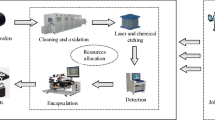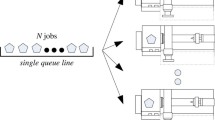Abstract
We investigate a difficult scheduling problem in a semiconductor manufacturing process that seeks to minimize the number of tardy jobs and makespan with sequence-dependent setup time, release time, due dates and tool constraints. We propose a mixed integer programming (MIP) formulation which treats tardy jobs as soft constraints so that our objective seeks the minimum weighted sum of makespan and heavily penalized tardy jobs. Although our polynomial-sized MIP formulation can correctly model this scheduling problem, it is so difficult that even a feasible solution can not be calculated efficiently for small-scale problems. We then propose a technique to estimate the upper bound for the number of jobs processed by a machine, and use it to effectively reduce the size of the MIP formulation. In order to handle real-world large-scale scheduling problems, we propose an efficient dispatching rule that assigns a job of the earliest due date to a machine with least recipe changeover (EDDLC) and try to re-optimize the solution by local search heuristics which involves interchange, translocation and transposition between assigned jobs. Our computational experiments indicate that EDDLC and our proposed reoptimization techniques are very efficient and effective. In particular, our method usually gives solutions very close to the exact optimum for smaller scheduling problems, and calculates good solutions for scheduling up to 200 jobs on 40 machines within 10 min.








Similar content being viewed by others
References
Altendorfer K, Kabelka B, Stöher W (2007) A new dispatching rule for optimizing machine utilization at a semiconductor test field. In: Advance semiconductor manufacturing conference IEEE/SEMI, pp 188–193
Arzi Y, Raviv D (1998) Dispatching in a workstation belonging to a re-entrant production line under sequence-dependent set-up times. Prod Plan Control 9:690–699
Balakrishnan N, Kanet JJ, Sridharan SV (1999) Early/Tardy scheduling with sequence dependent setups on uniform parallel machines. Comput Oper Res 26:127–141
Bank J, Werner F (2001) Heuristic algorithms for unrelated parallel-machine scheduling with a common due date, release dates, and linear earliness and tardiness penalties. Math Comput Model 33:363–383
Bilge Ü, Kırac F, Kurtulan M, Pekgün P (2004) A Tabu search algorithm for parallel machine total tardiness problem. Comput Oper Res 31:397–414
Bixby R, Burda R, Miller D (2006) Short-interval detailed production scheduling in 300 mm semiconductor manufacturing using mixed integer and constraint programming. In: Advance semiconductor manufacturing conference IEEE/SEMI, pp 148–154
Blackstone JH, Phillips DT, Hogg GL (1982) A state-of-the-art survey of dispatching rules for manufacturing job shop operations. Int J Prod Res 20:27–45
Dabbas R, Fowler JW (2003) A new scheduling approach using combined dispatching criteria in wafer fabs. IEEE Trans Semicond Manuf 16(3):501–510
Haupt R (1999) A survey of priority rule-based scheduling. OR Spectr 11:3–16
Hochbaum DS, Landy D (1997) Scheduling semiconductor burn-in operations to minimize total flowtime. Oper Res 45:874–885
Jula P, Leachman RC (2010) Coordinated multistage scheduling of parallel batch-processing machines under multiresource constraints. Oper Res 58:933–947
Kim CO, Shin HJ (2003) Scheduling jobs on parallel machines: a restricted Tabu search approach. Int J Adv Manuf Technol 22:278–287
Kim YD, Lee DH, Kim JU (1998) A simulation study on lot release control, mask scheduling, and batch scheduling in semiconductor wafer fabrication facilities. J Manuf Syst 17:107–117
Kim SS, Shin HJ, Eom DH, Kim CO (2003) A due date density-based categorising heuristic for parallel machines scheduling. Int J Adv Manuf Technol 22:753–760
Kurz ME, Askin RG (2001) Heuristic scheduling of parallel machines with sequence-dependent set-up times. Int J Prod Res 39:3747–3769
Lee YH, Bhaskaran K, Pinedo M (1997) A heuristic to minimize the total weighted tardiness with sequence dependent setups. IIE Trans 29:45–52
Lee YH, Park JK, Kim SY (2002) Experimental study on input and bottleneck scheduling for a semiconductor fabrication line. IIE Trans 34:179–190
Logendran R, McDonell B, Smucker B (2007) Scheduling unrelated parallel machines with sequence-dependent setups. Comput Oper Res 34:3420–3438
Ovacik IM, Uzsoy R (1995) Rolling horizon procedures for dynamic parallel machine scheduling with sequence-dependent setup times. Int J Prod Res 33:3173–3192
Pinedo M (1995) Scheduling theory algorithm and systems. Prentice Hall Englewood Cliffs, New Jersey
Schutten JMJ (1996) List scheduling revisited. Oper Res Lett 18:167–170
Sivrikaya-Serifoglu F, Ulusoy G (1999) Parallel machine scheduling with earliness and tardiness penalties. Comput Oper Res 26:773–787
Wang C, Ghenniwa H, Shen W (2005) Heuristic scheduling algorithm for flexible manufacturing systems with partially overlapping machine capabilities. Mechatron Autom IEEE Int Conf 3:1139–1144
Zhu X, Wilhelm WE (2006) Scheduling and lot sizing with sequence-dependent setup: a literature review. IIE Trans 38:987–1007
Acknowledgments
I-Lin Wang was partially supported by the National Science Council of Taiwan under Grant:NSC 100-2410-H-006-006-MY2. Yi-Chi Wang was partially supported by the National Science Council of Taiwan under Grant:NSC 100-2221-E-035-076-MY3.
Author information
Authors and Affiliations
Corresponding author
Rights and permissions
About this article
Cite this article
Wang, IL., Wang, YC. & Chen, CW. Scheduling unrelated parallel machines in semiconductor manufacturing by problem reduction and local search heuristics. Flex Serv Manuf J 25, 343–366 (2013). https://doi.org/10.1007/s10696-012-9150-7
Published:
Issue Date:
DOI: https://doi.org/10.1007/s10696-012-9150-7




